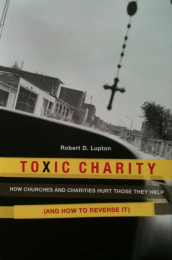This is a provocative book – a ‘must read’ for those working among people who are poor or disadvantaged, espcially in an urban setting.
 But first, the church I belong to (CCK, Brighton) was live on BBC television last Sunday? This was a one hour Pentecost service. You can watch it on this link.
But first, the church I belong to (CCK, Brighton) was live on BBC television last Sunday? This was a one hour Pentecost service. You can watch it on this link.
When helping hurts
In recent months I have been recommending widely When helping hurts. As the title suggests our well-intentioned generosity may sometimes cause greater problems rather than relieving them (but not always!). It looks critically at the damage we can cause, particularly with cross-cultural ministry among the poor, and suggests how we can improve our practice.
Toxic Charity
 Here is another thought-provoking read to make you think through your stance on how you really can help those who are poor or disadvantaged, and recognise the pitfalls and damage you can cause inadvertantly. But don’t read it unless you are willing to be challenged and are prepared to think through some hard questions and examine your own attitudes.
Here is another thought-provoking read to make you think through your stance on how you really can help those who are poor or disadvantaged, and recognise the pitfalls and damage you can cause inadvertantly. But don’t read it unless you are willing to be challenged and are prepared to think through some hard questions and examine your own attitudes.
Predominantly based on poverty within western urban communities, especially the USA, Toxic Charity honestly addresses some of the intellectual and challenging dilemmas we all face from time to time when considering our attitudes and practice.
The following questions are mine, but they open the window on some of what Robert Lupton addresses.
• Should I always give to someone on the street who asks for money? Surely Jesus says that we are to give to those who ask. And yet we know that often such ‘generosity’ may feed a drug habit. (When three respected church leaders were asked this question there were three contrasting answers – ‘Always’, ‘Sometimes’, ‘Never’. So there is clearly no easy answer!)
• What is the place of ‘food banks’? Do free hand-outs undermine dignity? Should we elevate relationship above meeting material need?
• Do we analyse a situation correctly? Responding to chronic need (hunger) as if it were a crisis (life threatening starvation) may produce toxic results: dependency, deception (to continue to receive the handout), disempowerment. Is this really what we want to achieve?
• How do we turn the relationship of the empowered helping the disempowered into one of working together to improve a situation? How do we move from a hand-out culture to an empowering one?
• How do top-down initiatives perform (whether from government or church leadership) compared with grass-roots participative initiatives? Which alternative produces the greatest long-term benefits?
• Is it possible to counter erosion of the work ethic which may be fostered by welfare?
• What is the place of entrepreneurship and social enterprise in unlocking poverty?
• Internationally, what lessons can be learnt from so-called developing nations that can be applied in the western world? For example, could community based micro-finance work in the west?
• Are work parties to another ‘poor’ nation good value? Would it not be better just to donate the cost of such visits to the hosts?
• Does the ‘added value’ for the visiting team in gaining an understanding of cross-cultural issues justify the expense and inconvenience to the local hosts? Indeed, what do the hosts think about these teams?
There are no easy answers to such questions but I urge you to read this book in your quest to formulate them. It is liberally illustrated with stories of both good and bad practice to help you think through some of the issues raised, issues you may never even have recognised as being issues. To do so will equip you to out-work God’s heart for the poor in an increasingly effective way, whether in your local community or in a far-off country.
Above all, do no harm
Robert Lupton proposes an Oath for Compassionate Service. I suggest you consider each statement prayerfully – or even in a discussion group – and consider how you might allow this Oath to affect your ministry practice.
• Never do for the poor what they have (or could have) the capacity to do for themselves
• Limit one-way giving to emergency situations
• Strive to empower the poor through employment, lending, and investing, using grants
sparingly to reinforce achievement
• Subordinate self-interests to the needs of those being served
• Listen closely to those you seek to help, especially to what is not being said – unspoken
feelings may contain essential clues to effective service
• Above all, do no harm
As you grapple with issues raised in this book, and respond by taking appropriate action, my prayer is that you will become a change agent, facilitating those who are poor to be lifted from poverty (of mind, body or spirit) to become oaks of righteousness.
For a full review of this book click here
